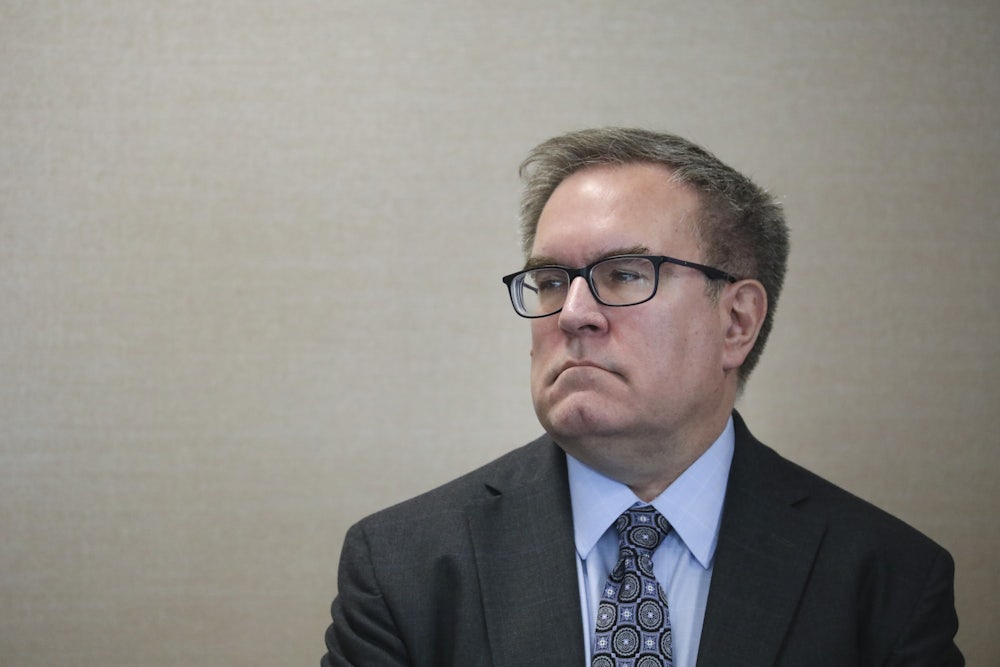Environmental Protection Agency Administrator Andrew Wheeler is not your average climate denier. Unlike President Donald Trump, he’s admitted that global warming is real and caused by humans. And unlike many Republicans in the House and Senate, he’s admitted that its effects will be dangerous if warming continues unabated.
But when it comes to admitting that swift, aggressive action is necessary to slow the dangers of climate change, Wheeler is just like most Republicans: He denies it. In an interview with “CBS This Morning” on Wednesday, the former coal industry lobbyist said that global warming is simply too vague and distant a threat to focus on.
“On the climate change issue, it is an important issue that we have to be addressing and we are addressing it,” Wheeler said. “But most of the threats from climate change are 50 to 75 years out.” Instead of climate change, Wheeler argued that the EPA’s efforts would be better spent focusing on cleaning up water in other countries. “We have 1,000 children die every day worldwide because they don’t have safe drinking water,” he said. “That’s a crisis I think we can solve.”
If humans didn’t intend to keep living 50 to 75 years from now, Wheeler’s argument might be a good one. But we do, making his argument exceedingly bad—as Twitter was kind enough to point out.
New EPA Administrator Andrew Wheeler’s feeling on the urgency of climate change?
— Nick Knudsen 🇺🇸 (@DemWrite) March 20, 2019
Meh. 🤷🏻♂️ Why worry? The effects of climate change are still “50 To 75 Years Out”.
Wonder how the kids feel about that perspective. https://t.co/DcOCv6196z
Wheeler’s premise is also just plain wrong. “Most of the threats” from climate change are not far in the future; some really bad ones are happening right now.
EPA administrator Wheeler says the effects of climate change are “50 to 75 years out,” which I’m sure is a huge comfort to *checks notes* enormous swaths of humanity? pic.twitter.com/9USkbB4j5r
— Dave Levitan (@davelevitan) March 20, 2019
The EPA chief’s claim that water pollution is a better focus because it’s a crisis “we can solve” also falsely implies that climate change doesn’t fall into that category. Last year, thousands of scientists from around the world put out a report saying humanity can prevent the worst climate impacts of the next 50 to 75 years—but only if we rapidly decarbonize the planet within about a dozen years. And even if we don’t rapidly decarbonize within that time frame, we can still slow and prevent many terrible events by reducing emissions as quickly as we can.
The danger of Wheeler’s comments, though, isn’t that they’re wrong or dumb. It’s that they’re extremely relatable. They represent everything the human brain wants to hear about climate change: that nothing that bad is currently happening; that anything truly awful will occur far down the road; and that we have plenty of time and space to prevent those horrific things from happening—even though the evidence tells us otherwise. “[Our] inability to deal with climate change is due in part to the way our mind is wired,” reads a Time article from 2013, which outlines the psychological barriers to climate action.
Those psychological barriers have historically prevented much of the population from prioritizing global warming. And for the first time in a very long time, that’s changing. As Robinson Meyer wrote in The Atlantic on Tuesday, America is experiencing “a potential upheaval in how important voters consider climate policy.” That’s inspired at least some Republicans stop denying the problem and start focusing on solutions, Meyer wrote.
Wheeler doesn’t seem interested in solutions. So he’s resorted to playing on the most powerful de-motivator we have: our brains.
